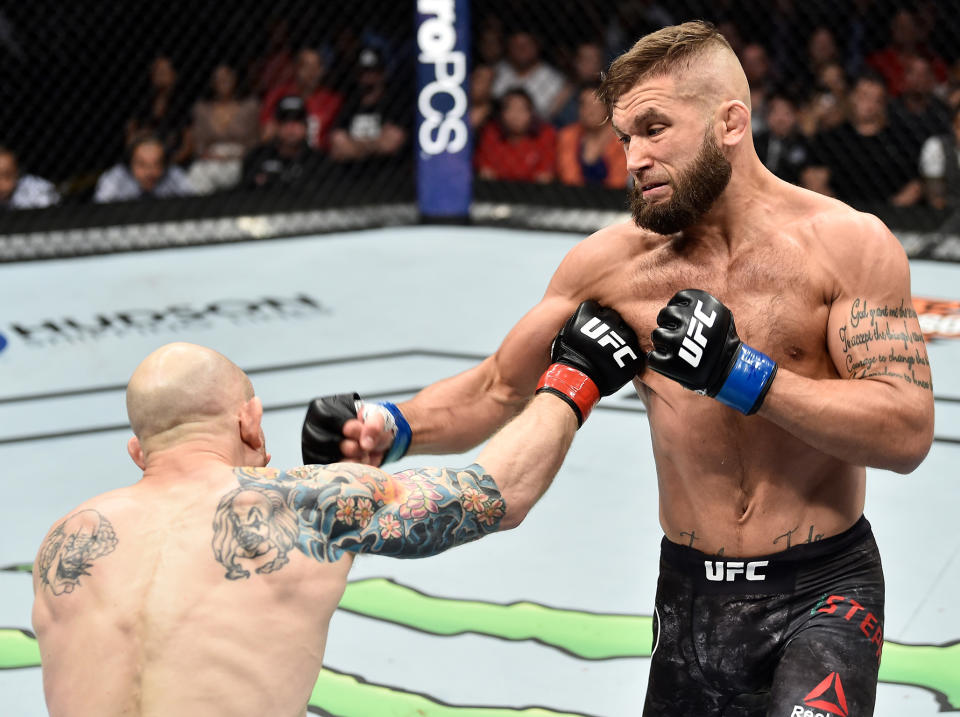The UFC has a rules crisis and it's getting worse

Jeremy Stephens’ finishing flourish against Josh Emmett in the second round of their UFC on Fox 28 main event on Saturday night in Orlando was something to behold.
The series began with a wicked left uppercut, then was followed by a series of elbows, a knee and a few more elbows which finally put Emmett out cold. It was like something out of the earliest days of the UFC, or maybe the heyday of Japan’s Pride Fighting Championships.
And therein lies the problem.
Stephens’ flurry included a sequence in which several elbows landed to the back of Emmett’s skull, which is illegal. It also included a knee to the head of the downed Emmett, which is likewise verboten. None of these drew so much as a rebuke from referee Dan Miragliotta, who has long been considered one of the sport’s top officials.
And with it, an issue which has been simmering on the surface for quite some time got pushed to the forefront in front of a network television audience: Referees are not enforcing the rules of mixed martial arts, and the consequences are starting to add up.
It’s understandable, to a degree, why referees want to err on the side of leniency. This isn’t like basketball, where a foul shot accounts for a single point in a game in which one or both teams could reach 100. Most MMA fights are three rounds (championship fights and main events five), and are scored under a 10-point must system inherited from boxing that has long served as an ill fit for the sport.
A point deduction, much less a disqualification, makes for a huge swing in the fight’s potential outcome. A one-point difference can turn a win into a draw and a draw into a loss.
The referees also understand that the fans paid money to see the fighters fight, and not to see the officials make themselves the story, which also adds to the pressure of not wanting to call fouls.
But if a fighter knows that he or she is basically going to get a couple freebies from the referee before they get so much as a warning, why wouldn’t they take advantage?
If Stephens’ finish of Emmett was an isolated incident, it might not be that big of a deal, but this has been building for months. On Feb. 11, at UFC 221 in Perth, Australia, a hapless local official watched welterweight Li Jingliang get out of a choke with a blatant eye gouge of Jake Matthews, one which opened a gnarly cut over the corner of Matthews’ right eye.
The referee simply brushed Jingliang’s hand away, and that was that. The fight went the distance before Matthews won via decision.
Compounding matters, the UFC actually awarded Matthews vs. Jingliang a Fight of the Night bonus, for a bout which very likely would have finished before it could get to that stage if Jingliang hadn’t egregiously cheated.
The message the UFC sent was that if you try to gouge someone’s eye out, you’ll take home an extra $50,000 for your efforts.
And back on Dec. 9 at UFC Fight Night 123 in Fresno, California, Jason Knight actually bit the fingers of Gabriel Benitez in the clinch. At least in this case, the referee, Mark Smith, issued a point deduction. Benitez went on to win via unanimous decision.
At UFC 1 in 1993, back when the promoters used “There are no rules!” as their marketing pitch, quite literally the only two things explicitly banned were eye gouging and biting. Maybe there’s some degree of leeway with the current rules, but can we at least agree that the only infractions which were considered out of bounds during the “anything goes” era should be cause for an automatic disqualification? Can we at least set the bar there?
That bar needs to be set somewhere. The various state athletic commissions have adopted a bunch of slightly different rulesets from one another, which leads to confusion. Florida, which oversaw Stephens vs. Emmett, doesn’t use instant replay, which could have cleared things up.
This also led to a fairly ridiculous scene on FS1’s postfight show in which color commentators Daniel Cormier and Dominick Cruz got into a heated argument over whether Stephens’ strikes were legal.
Cruz is a longtime teammate of Stephens at San Diego’s Alliance MMA, and he did a brutal job trying to pass off blatantly illegal strikes as legal. Imagine, for a moment, that Tony Romo, in his new job as NFL color commentator, flagrantly rooted for the Dallas Cowboys, his former team, and was clearly on the wrong side of the debate? He would rightly be criticized from coast to coast. But in MMA, fighters with rooting interests are considered OK for the booth.
We’re not claiming Stephens intended to cheat. Things happen in the heat of the battle. Emmett was turning while Stephens was in the process of throwing elbows, although that doesn’t excuse the knee to the head, which is illegal when an opponent’s knees are down in all cases.
There’s no simple solution. But there are things each party can do to help untangle what’s turned into a messy situation.
If the referee broke up the action at the first sign of illegal strikes, this doesn’t happen.
If the commissions put their egos aside and adopted a uniform set of rules rather than acting like 50 little fiefdoms, they’d make the referees’ high-pressure job a whole lot easier, and eliminate fighter excuses about confusion over the ruleset.
If the networks are going to keep using active fighters as commentators, at least have the common sense to keep them off shows headlined by their teammates. Cruz’s blatant bias toward his teammate only muddied the conversation.
If the UFC stops incentivizing cheating in its bonus system — Stephens, like Jingliang before him, earned a postfight bonus for his efforts — then maybe fewer fighters would push the boundaries.
This systematic failure ended up with Emmett in an Orlando hospital with an orbital bone that was broken in three places. The consequences of lax rules enforcement are too real to let this continue unabated.
More from Yahoo Sports:
• Iowa PG misses record-breaking FT — on purpose
• Transgender wrestler wins title again
• Ivanka Trump did what VP Pence didn’t do at Olympics
• U.S. bobsledder responds to ‘haters’ over Trump photo

